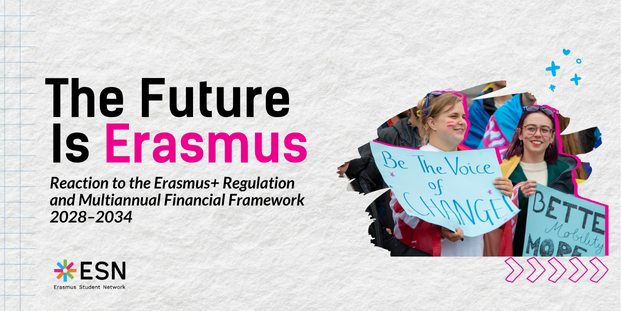
The Erasmus Student Network (ESN) acknowledges the European Commission’s proposal for a Regulation of the European Parliament and of the Council establishing the Erasmus+ programme and the Multiannual Financial Framework (MFF) for the period 2028–2034. We welcome the continued prioritisation of education, youth, and sport within the Union’s long-term strategy, and the reaffirmation of Erasmus+ as a flagship and standalone programme. However, the proposals fall short of the structural ambition and resourcing needed to meet the programme’s objectives.
The Erasmus+ programme is a cornerstone of the European Education Area, contributing to quality education, skills development, and social cohesion. Yet despite its growing reach and popularity, access to mobility remains uneven. In fact, as mentioned in the interim evaluation of the 2021-2027 programme: “despite a 40% budget increase compared to its predecessor, the programme was not able to fully satisfy the high demand across the different sectors, resulting in a low success rate”.
It is therefore clear that the proposed Erasmus+ budget of €40.8 billion, for the 2028-2034 cycle is not sufficient to meet the Union’s own mobility targets or meaningfully expand access. This is particularly evident when adjusted for inflation and considering the integration of the European Solidarity Corps (ESC), which further dilutes the real increase in funding. ESN reiterates its call for a fivefold increase in the Erasmus+ budget, based on Mario Draghi and Enrico Letta’s reports. At the same time, ESN expresses concern about the absence of a guaranteed minimum allocation for each sector. The proposed flexibility to annually define targets and objectives based on evolving needs and priorities can directly affect the capacity of Higher Education Institutions and National Agencies to engage in long-term planning. Without safeguards, there is a serious risk of undermining student mobility, one of the most well-known features of the programme.
While skills development remains a vital dimension of Erasmus+, the programme must not be reduced to a narrow labour market instrument. For nearly 36 years, Erasmus+ has served as a unique force for European cohesion, educational innovation, and the development of a shared civic space across generations of learners. Its value lies equally in fostering mutual understanding, cultural exchange, and solidarity, principles that are central to the future of the European Union and the world.
This is further reinforced by the complementarity between Erasmus+ and Global Europe, which reflects the EU’s ambition to strengthen its external action, international partnerships, and people-to-people diplomacy. By supporting education, youth mobility, and capacity-building abroad, the new programme seeks to enhance Erasmus+ in its role of fostering global citizenship, promoting intercultural understanding, and attracting talent. This is not only pursued through a stronger budget but also through the introduction of new instruments such as partial associations for accession countries, candidate and potential candidate countries, as well as countries covered by the European Neighbourhood Policy.
However, further clarification should be provided on the strategic synergies with other flagship initiatives such as Global Gateway, which otherwise risks limiting their overall impact. In the field of education, the trend is twofold. While the overall financial envelope for external action has the potential to be significantly increased, education will no longer benefit from a dedicated funding target as it did in the 2021–2027 period. Instead, it is now embedded within broader priorities related to human development, international partnerships, and geopolitical engagement. Strengthening Global Europe alongside Erasmus+ is essential to ensure coherence between the EU’s internal and external policies and to uphold Europe’s leadership in promoting sustainable, values-based international cooperation.
At the same time, ESN calls for greater clarity regarding several elements of the proposed regulations, particularly the future direction of horizontal priorities and the development of new mobility opportunities. Having closely monitored the implementation of these priorities throughout the current programme cycle, ESN recognises the progress achieved in areas such as inclusion, environmental sustainability, digital transformation and civic engagement. While we welcome the dedicated chapter on inclusion and diversity, the reduced emphasis on the other priorities raises concerns. Changing or deprioritising focus areas now risks undermining the advancements made and the continuity needed to embed these priorities structurally across the programme.
ESN also notes the proposed introduction of Erasmus+ scholarships in strategic educational fields. However, the scope, target groups, and distinction from existing initiatives such as Erasmus Mundus remain unclear and require further clarification. Additionally, the strategic focus appears predominantly on STEM disciplines. While the intention to attract more students to these fields is understandable, scholarships alone are unlikely to address the structural challenges that limit participation in STEM-related mobility. Without tackling structural issues such as academic rigidity, the measure risks being insufficient to meet its intended goals.
Finally, ESN highlights the importance of visibility and outreach of the Erasmus+ as the flagship initiative of the EU. We welcome the proposal’s ambition to mobilise former participants in promoting the programme and strengthening the post-mobility phase. This ambition aligns with the Union’s of Skills agenda, as ESNsurvey findings confirm that mobile students most commonly acquire transversal competences and skills that are highly relevant for Europe’s future.
We call upon the European Parliament and the Council of the European Union to preserve and expand the impact of one of the EU’s most effective instruments for advancing education, equity, and civic engagement. The Erasmus Generation is ready to lead in shaping the future of Europe, but we need a programme that fully reflects our realities and our ambitions.

Follow ESN